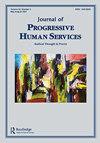Deep Transformation toward Decoloniality in Social Work: Themes for Change in a Social Work Higher Education Program
IF 0.8
Q1 SOCIAL WORK
引用次数: 7
Abstract
ABSTRACT This article describes thematic outcomes of a process of engagement around deep transformation toward Decoloniality in a university social work education program. Given the gravity of working toward Decoloniality for social work education in South Africa, it was critical to theorize about this process. Current South African realities evidence ongoing structures of Coloniality and Apartheid which permeate all spheres, not least the domains of knowledge, power, and relationships in higher education. However, a narrow interpretation of Decoloniality relating only to ‘curriculum’ or ‘indigeneity’ as potential for change, is problematic. Ignoring material realities of ongoing Coloniality perpetuates the very oppressive structures it seeks to overcome and so depth transformation which engages with all levels of a social work education program is required. This article engages with thematic areas that emerged and which shaped work toward Decoloniality, among social work educators at one higher education department. These included domains for engagement with Decoloniality (theorists; pedagogy; educators; learners; content; research and discourse; context) and principles for such work (Afrika as the center; attention to power dynamics; race, class, and gender; acknowledgment of structural issues; critical conscientization and voice; Ubuntu). These thematic areas now form the basis of the new social work program at the University.社会工作向非殖民化的深度转型:社会工作高等教育计划的变革主题
这篇文章描述了在大学社会工作教育项目中围绕深度转型走向非殖民化的参与过程的主题结果。鉴于南非社会工作教育朝着非殖民化方向努力的重要性,对这一进程进行理论化是至关重要的。目前南非的现实证明,殖民主义和种族隔离的结构正在渗透到所有领域,尤其是知识、权力和高等教育中的关系领域。然而,仅仅将“课程”或“土著”作为潜在的改变来狭隘地解释去殖民化是有问题的。忽视正在进行的殖民主义的物质现实会使它试图克服的压迫性结构永久化,因此需要与社会工作教育计划的各个层面进行深度转变。这篇文章涉及了在一个高等教育部门的社会工作教育者中出现的主题领域,这些主题领域塑造了走向非殖民化的工作。这些领域包括参与非殖民化(理论家;教育学;教育工作者;学习者;内容;研究与论述;背景)和这项工作的原则(以非洲为中心;关注权力动力学;种族、阶级和性别;承认结构性问题;批判性的责任感和声音;Ubuntu)。这些主题领域现在构成了大学新的社会工作课程的基础。
本文章由计算机程序翻译,如有差异,请以英文原文为准。
求助全文
约1分钟内获得全文
求助全文
来源期刊

Journal of Progressive Human Services
SOCIAL WORK-
CiteScore
3.20
自引率
8.30%
发文量
14
期刊介绍:
The only journal of its kind in the United States, the Journal of Progressive Human Services covers political, social, personal, and professional problems in human services from a progressive perspective. The journal stimulates debate about major social issues and contributes to the development of the analytical tools needed for building a caring society based on equality and justice. The journal"s contributors examine oppressed and vulnerable groups, struggles by workers and clients on the job and in the community, dilemmas of practice in conservative contexts, and strategies for ending racism, sexism, ageism, heterosexism, and discrimination of persons who are disabled and psychologically distressed.
 求助内容:
求助内容: 应助结果提醒方式:
应助结果提醒方式:


